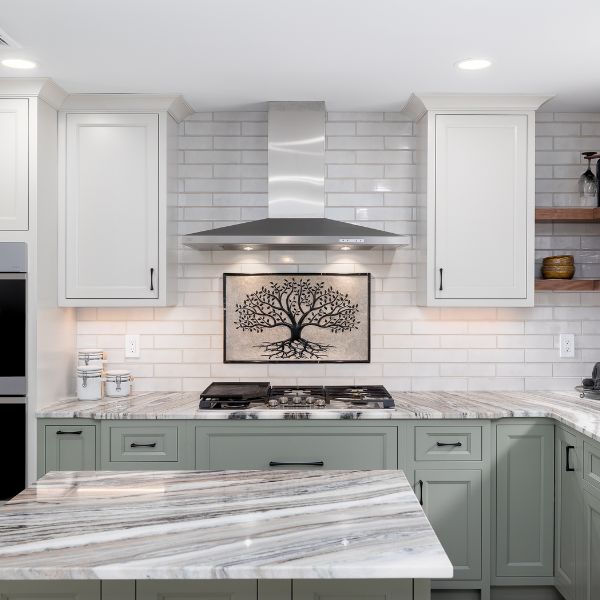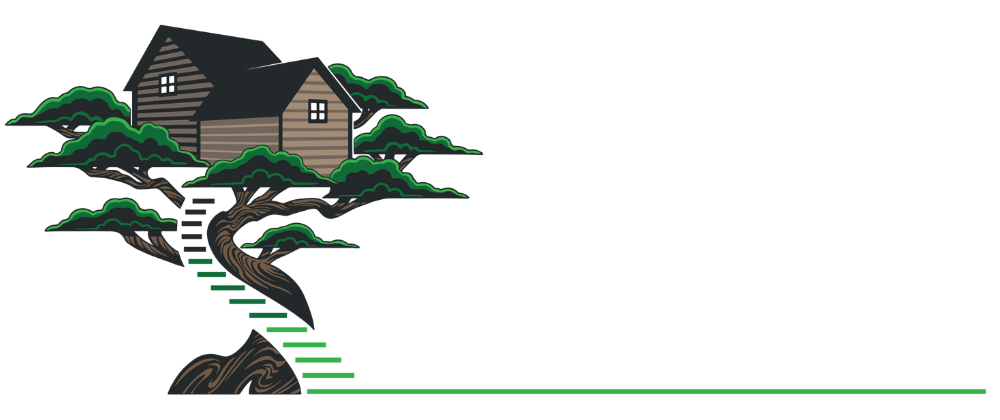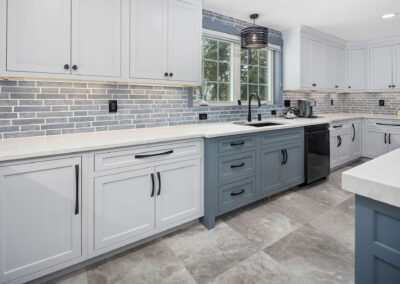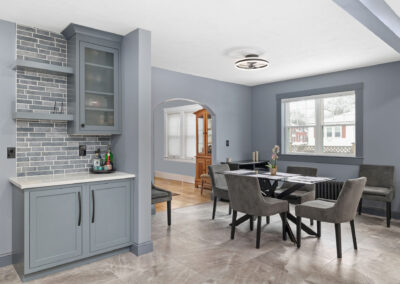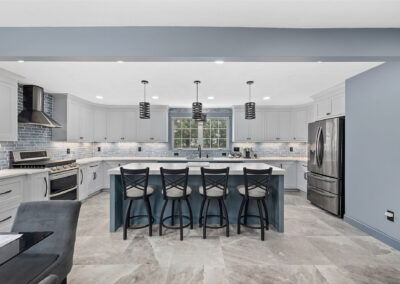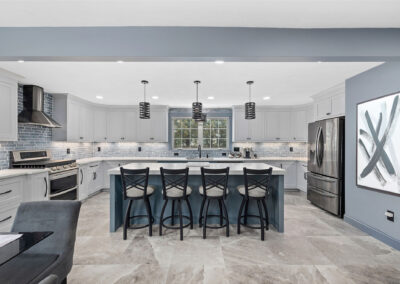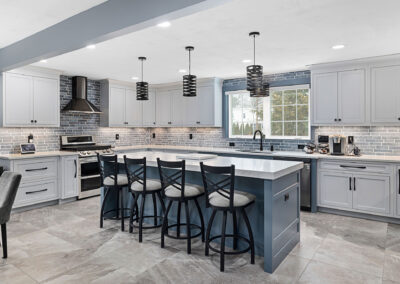bathroom, bonsai, floor, renovation, interior design, customer, customer service, kitchen cabinet, bathroom remodeling, bathroom remodel, lighting, bedroom, cabinetry, construction, supply chain, home improvement, countertop, brand, boston kitchen remodel, sink, houzz, granite, showroom, quartz, shower, room, architect, beauty, tile, greater boston, dream kitchen, custom kitchen, kohler, custom cabinetry, kitchen and bathroom, supply new england, kitchen design showroom, communication, knowledge
Is bamboo flooring good in a kitchen?
Bamboo flooring is a good option for a kitchen due to its durability and water-resistant properties. It can withstand moisture and heavy foot traffic while offering a stylish, eco-friendly aesthetic that complements various kitchen designs.
Can you put bamboo flooring in a kitchen?
Bamboo flooring can be installed in a kitchen. It is durable, water-resistant, and offers a stylish look, making it a suitable choice for this high-traffic space, provided proper maintenance and sealing are applied to protect against moisture.
What is the best flooring for kitchen and bath?
The best flooring for kitchens and baths combines durability with water resistance. Options like tile, luxury vinyl plank, and water-resistant laminate provide both style and practicality, making them ideal choices for these high-traffic, moisture-prone areas.
What is the best flooring for a kitchen and bathroom?
The best flooring for a kitchen and bathroom should be durable, water-resistant, and easy to maintain. Options like luxury vinyl plank, tile, and waterproof laminate offer excellent performance while enhancing the aesthetic appeal of these high-traffic areas.
What are the pros of bamboo flooring?
The pros of bamboo flooring include its eco-friendliness, durability, and aesthetic appeal. Bamboo is a rapidly renewable resource, offers a unique and stylish look, and is resistant to moisture and pests, making it an excellent flooring choice for many homes.
How durable is bamboo flooring in kitchens?
Bamboo flooring's durability in kitchens is commendable, as it is harder than traditional hardwoods, making it resistant to dents and scratches. Its natural moisture resistance also helps it withstand spills and humidity, ensuring longevity in a busy kitchen environment.
Is bamboo flooring easy to maintain?
Bamboo flooring is easy to maintain thanks to its durable surface, which only requires regular sweeping and occasional damp mopping to keep it looking pristine. It resists stains well, making it an excellent choice for busy households.
What styles complement bamboo kitchen flooring?
Styles that complement bamboo kitchen flooring include modern minimalism, coastal aesthetics, and contemporary farmhouse. Neutral color palettes and natural materials enhance bamboo's warmth, while bold accents can create a striking contrast for a stylish, inviting space.
How does bamboo flooring compare to tile?
Bamboo flooring and tile differ significantly in terms of warmth and comfort versus durability and water resistance. Bamboo offers a natural, softer feel, while tile provides excellent moisture resistance and is ideal for high-traffic areas.
Is bamboo flooring suitable for high traffic areas?
Bamboo flooring can be suitable for high traffic areas due to its durability and resistance to wear. However, the quality of the bamboo and proper installation play crucial roles in its performance in such environments.
Can bamboo flooring withstand moisture in kitchens?
Bamboo flooring can resist moisture to some extent, making it a suitable option for kitchens, but it's essential to maintain proper sealing and avoid excessive water exposure to prevent damage over time.
What colors are available for bamboo flooring?
The available colors for bamboo flooring include natural hues like light and dark shades, as well as carbonized tones that create a rich, warm appearance. Choices can range from golden blond to deeper browns, providing versatile design options.
How to properly clean bamboo flooring?
Properly cleaning bamboo flooring involves sweeping or vacuuming regularly to remove dirt and debris, then using a damp mop with a gentle cleanser designed for wood. Avoid excessive moisture and harsh chemicals to maintain its beauty and durability.
What are the environmental benefits of bamboo flooring?
The environmental benefits of bamboo flooring include its rapid renewability, as bamboo grows significantly faster than traditional hardwoods. Additionally, bamboo absorbs more carbon dioxide and produces more oxygen, making it a sustainable and eco-friendly flooring option.
Is bamboo flooring hypoallergenic for kitchens?
Bamboo flooring is considered hypoallergenic for kitchens because it resists allergens such as dust mites and mold. Its smooth surface and natural antimicrobial properties make it a favorable choice for maintaining a cleaner, healthier environment.
How does bamboo flooring perform during humidity?
Bamboo flooring performs well in humidity due to its natural resistance to moisture. However, it’s still essential to maintain proper humidity levels to prevent expansion or contraction, ensuring long-lasting durability and stability in various environments.
Can bamboo flooring be refinished if scratched?
Bamboo flooring can be refinished if scratched, though the ability to do so depends on the thickness of the wear layer. Solid bamboo can generally handle refinishing, while engineered versions may have limited possibilities.
What installation methods are best for bamboo flooring?
The best installation methods for bamboo flooring are floating, glue-down, and nail-down techniques. Each method offers unique advantages, with floating installations being the easiest for DIY projects, while glue-down provides strong adherence, and nail-down is ideal for thicker planks.
What is the cost range for bamboo flooring?
The cost range for bamboo flooring varies between $2 to $8 per square foot, depending on the quality, brand, and style. Factors such as installation and location may also influence the overall cost.
Are there specific brands recommended for bamboo flooring?
Specific brands recommended for bamboo flooring include Cali Bamboo, Ambient Bamboo, and Moso Bamboo, known for their quality, durability, and environmentally friendly practices. These brands offer a variety of styles and finishes to suit different design preferences.
How does bamboo flooring affect home value?
Bamboo flooring can positively affect home value by enhancing aesthetic appeal and promoting eco-friendliness, attracting environmentally conscious buyers. Its durability and unique characteristics also contribute to a modern and desirable home environment.
What are common issues with bamboo flooring?
Common issues with bamboo flooring include susceptibility to scratching, moisture damage, and fading from prolonged sunlight exposure. Additionally, lower-quality bamboo can warp and may not be as durable as traditional hardwoods. Careful selection and maintenance are essential.
Can bamboo flooring be used over radiant heat?
Bamboo flooring can be used over radiant heat systems, provided it is engineered bamboo. This type is more stable and less likely to expand or contract with temperature changes, making it suitable for heated floors.
What patterns can be created with bamboo flooring?
Bamboo flooring can be crafted into various patterns, including traditional horizontal and vertical styles, as well as intricate designs like herringbone, chevron, and basketweave. These patterns enhance the visual appeal and versatility of bamboo, making it suitable for diverse interior settings.
Is there eco-friendly bamboo flooring available?
Eco-friendly bamboo flooring is indeed available. It is a sustainable choice, as bamboo is a rapidly renewable resource, making it an environmentally conscious option for flooring that combines durability with style.
How does bamboo flooring handle spills and stains?
Bamboo flooring handles spills and stains effectively due to its resistance to moisture and durability. Quick clean-up of liquids minimizes potential damage, while its natural surface can resist some stains when promptly addressed, making it a practical choice for busy households.
Is professional installation recommended for bamboo flooring?
Professional installation is highly recommended for bamboo flooring. This helps ensure proper alignment and installation techniques are used, preventing issues like warping and ensuring the longevity of your flooring.
What is the lifespan of bamboo flooring?
The lifespan of bamboo flooring can be quite substantial. Typically, high-quality bamboo flooring can last between 20 to 25 years with proper care and maintenance, making it a durable choice for various spaces.
Are there bamboo flooring options for bathrooms?
Bamboo flooring options are indeed available for bathrooms. However, it's essential to choose specially treated, water-resistant bamboo products to ensure durability and prevent moisture damage.
How does bamboo flooring compare in comfort?
Bamboo flooring offers a unique blend of comfort and support, often feeling softer underfoot compared to traditional hardwood. Its resilience and slight elasticity contribute to a more pleasant walking experience, making it a comfortable choice for many homeowners.
bonsai kitchen bath and flooring, kitchen design showroom ma, kitchen design massachusetts, kitchen design showroom massachusetts
